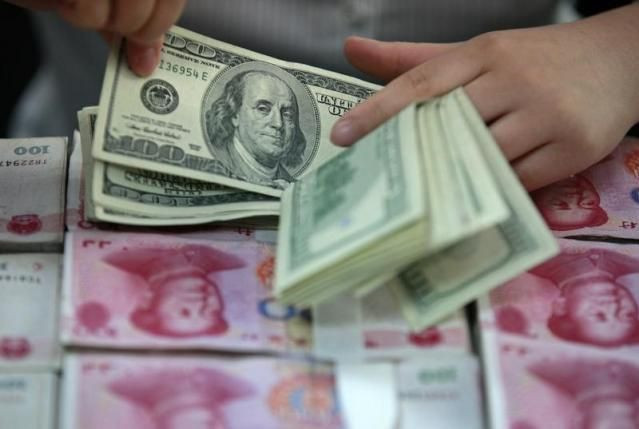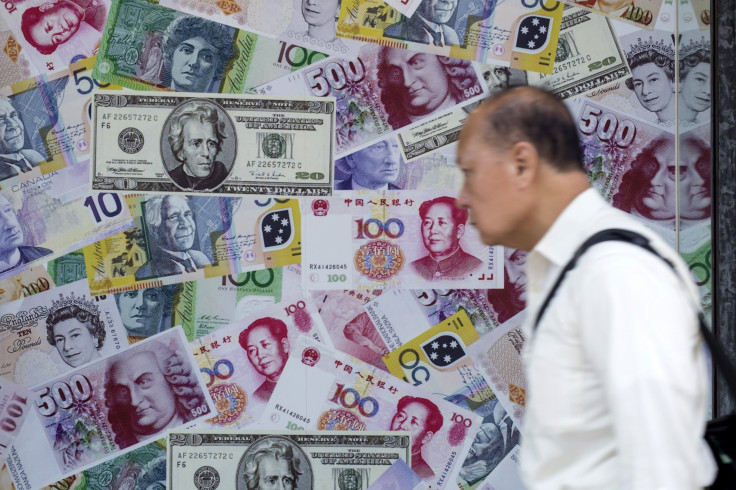China’s Foreign Exchange Reserves Fell Again In September, But Rate Of Decline Slows; Markets React With Surge

SHANGHAI -- China’s foreign exchange reserves fell again in September, for the fifth month in succession. However the drop of $43.3 billion dollars was less than half that in August, when reserves plunged $93.9 billion and set alarm bells ringing about capital outlfows, following China’s devaluation of its currency.
And with September’s decline in foreign exchange reserves significantly lower than the $57 billion previously predicted by economists in a Bloomberg survey, China’s stock markets responded positively Thursday, as they reopened after a week-long break for the National Day holiday. The main Shanghai Composite Index was up 3.25 percent in morning trading, while the secondary Shenzhen Composite Index was 4.4 percent higher, and the Nasdaq-like ChiNext Index surged over 5 percent.
Analysts said the slowdown in the decline of China's foreign exchange reserves suggested greater confidence in the government’s determination to stabilize the yuan, which was effectively devalued by almost 3 percent in mid-August, in a move that caught global markets by surprise and led to questions about the government’s economic policies.

A Goldman Sachs report, quoted by Chinese media, said the government had given clearer signs of policy support for the yuan in recent weeks. State media noted that the continuing decline in the reserves was due in part to government intervention in currency markets to stabilize the yuan. And the government has also taken action to limit capital outflows, including new restrictions on how much money Chinese citizens can withdraw when traveling overseas.
China’s foreign exchange reserves totaled $3.514 trillion at the end of last month, still the largest in the world -- though significantly lower than the peak of almost $4 trillion in June 2014.
Concerns about China’s economy remain, however, with third-quarter GDP growth -- to be announced later this month -- predicted to slow to anywhere between 6.4 percent and 6.8 percent, compared to 7 percent in the first half of this year, and 7.3 percent last year. Falling exports have also contributed to the decline in foreign currency reserves, though China’s trade surplus rebounded last month.
Officials at China’s central bank have also said that more foreign exchange has gone into private hands, with many Chinese buying foreign currencies, both for fear of further devaluations, and with an anticipated rise in U.S. interest rates being another factor.
Luo Yuding, of Shanghai University of Finance and Economics, told local media that mass overseas tourism during the National Day holiday week could also lead to a faster decline in China’s foreign exchange reserves in October. Record numbers of Chinese citizens traveled to countries like Japan over the past week, state media reported.

And despite official reassurances, some foreign analysts are still predicting further declines in the value of the yuan in the coming months. However Ding Shuang, chief China economist at Standard Chartered Bank, was quoted by the Shanghai Daily as saying he expected capital outflows to ease in coming months, as companies improved their foreign debt structure. Ding also predicted government intervention to stabilize the currency would diminish in scope.
The Chinese government has said repeatedly in recent weeks that it does not plan further devaluations of the currency, and has said the move in August was primarily a technical adjustment aimed at allowing the yuan’s rate to become more market-driven. It has also pledged to push ahead with financial reforms, and the authorities on Thursday launched the first phase of a new Cross-border Interbank Payment System.
Analysts at ANZ Bank said in a note to International Business Times Thursday that this was a “major milestone” in the internationalization of the Chinese yuan, and would level the playing field for the yuan and other major currencies in interbank clearing.
© Copyright IBTimes 2024. All rights reserved.






















